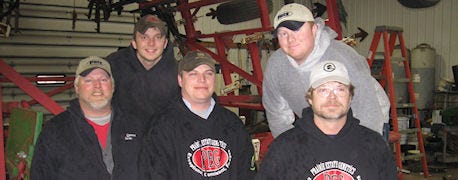August 2, 2013

By Harley Buchholz
For 165 years the Hesselink family has been farming in southeastern Sheboygan County. Brothers and farming partners Mike, Scott and Ben Hesselink still farm the original 80 acres cleared by Garret and Wilhemennia Hesselink, who came from the Netherlands in 1847 with two small children. Those early settlers survived Indian scares and fought the land as well, clearing trees and planting potatoes on open ground between tree stumps until the stumps could be pulled by a team of oxen.

ALL IN THE FAMILY: The Hesselink brothers are front row, from left, Mike, Ben and Scott, their nephew Aaron Peters, back left, and Mike's son, Jake, back right.
Mike, Scott and Ben, the sixth generation on that land, use 200-horsepower tractors, a self-propelled chopper and other power equipment to till and harvest on a farm that's grown to 1,600-plus owned and rented acres. They're proud of how far they've come but equally proud of their heritage. Mike and Christine's son, Jake (the seventh generation to work on the farm), and his wife, Kia, live in a house with some rooms that were built in 1869 and are raising their first child as the eighth generation on the farm. Mike, the eldest of the brothers, writes in a family history: "Our wish is to continue in the farming tradition as our ancestors have, for we feel it is a vital cause to our family, our community and our country."
They call their farm Quonset Farms, after a quonset-style barn that once housed the dairy herd. Dairying has been the main source of income for the Hesselink family for more than 150 years, though Mike's family history notes that there's been a full range of animal agriculture on the farm. Mike, Scott and Ben milk 800 cows in a double-15 milking parlor. Scott says the system can move 120 cows per hour. The herd is mostly Holstein with a few Jersey crosses that "we're moving away from," Mike says. "They've been getting fewer and farther between now," Ben adds. On three-times-a-day milking, the herd averages about 26,500 pounds of milk per cow, and "we're working on improving," according to Ben.
Herd replacements are raised on the farm except for 90 heifers that go to a custom raiser "just so we're not overcrowded," Ben says.
Cows are bred for a combination of production and type, the brothers agree. They've been partners since 1998. Mike took University of Wisconsin Farm Short Course classes, Ben went through the farm operations program at Fox Valley Technical College and Scott studied metal fabrication at Lakeshore Technical College. He does fabrication work on the farm and is in charge of maintenance, most of which is done on site, and fieldwork. Ben handles crop planning. Mike, who is the farm's general manager, oversees the dairy herd. There's also a herdsman, Jerry Bowling, who has been with the family for 40 years. Mike's wife does bookkeeping and Scott's wife, Lisa, does DNR and OSHA compliance and also helps oversee employees. Mike's and Christine's son, Jake, is in charge of feeding and his cousin, Aaron Peters, also works on the farm. There are 16 full-time employees in all.
The brothers see each other daily and sit down for meetings at least weekly, plus hosting monthly their advisory team of veterinarian, nutritionist, AI technician and herdsman. Do they disagree? "All the time," Ben laughs. "It's not that bad," Mike hastens to insert, "We've had heated discussions. That's part of being a family."
~~~PAGE_BREAK_HERE~~~
Future plans
Expansion is an ongoing discussion. The brothers' last major move was in 2008 when they bought the farm owned by their custom heifer-raiser as he retired. Now they're considering expanding their dairy herd by "80 to 100 cows," according to Scott. That might mean expanding the milking parlor, Ben adds, "and then we would have to add onto one of the freestall barns."
He plans a crop rotation of wheat, alfalfa and corn.
"We spring-seed with pea and oat cover a year after wheat," Mike says. "Then 3 to 4 years of hay, then corn for a few more years." Wheat is grown for its straw for bedding. The grain is sold. Ben says he looks for taller varieties for the straw but "it's harder to find good-yielding varieties with high straw. Sixty bushels per acre around here is pretty good." Last year, he notes, one field hit 90 bushels but another just 68. He also looks for 20-ton per acre corn silage yields. "All our corn is silage specific, Mike explains. Only about 15% goes into high moisture corn for the cattle. Alfalfa is harvested as haylage.
"In our plot for Dairyland Seed we've hit close to 8 to 9 wet tons the last couple of years," Mike says.
Quonset Farms hosts a few school tours each year, was the scene of Farm Technology Days in 2006 and Sheboygan County Breakfast on the Farm in 1996, when the brothers' dad, Mark Hesselink, was still active in the farming operation.
Scott and Ben are snowmobilers and motorcyclists with Ben often joining rides to raise funds for multiple sclerosis victims. Mike is a tractor pull contestant, taking off from mid-August to mid-September for "5-6 pulls in the area. The theme is pull with them like you farm with them," though, "I might tweak them a little."
Buchholz writes from Fond du Lac.
You May Also Like




